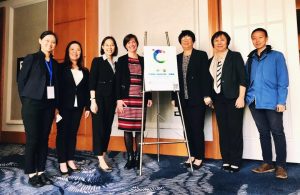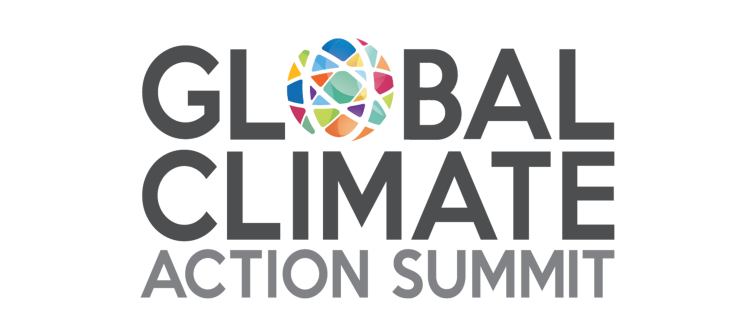Global Climate Action Summit San Francisco 2018
SAN FRANCISCO (September 12-14, 2018) – The Global Environmental Institute (GEI) co-hosted an affiliated event at the Global Climate Action Summit (GCAS) in September 2018.

GEI & friends arrive at GCAS San Francisco.
GEI co-facilitated announcement of the new program and discussion of the format for BRI and CSSC cooperation and the process by which participating nations can further develop and implement their NDC’s and improve financing and other implementation capacities through this program.
This affiliate event featured leadership and lessons learned from the China Subnational Low Carbon Development (LCD) program over the past decade, followed by introduction of the new framework for engagement in Southeast Asia through discussion with high-level representatives from China, and other countries.
China’s progress on subnational Low Carbon Development (LCD) capacity building and deployment played a central role in its commitments to reduce peak national emissions trajectories and join the US-China Bilateral and Paris COP21 agreements.
A range of cooperation activities between the US and China were critical to this success, including shared actions inside and outside government at both the national and subnational levels.
This historic bilateral cooperation helped define new global paradigms for mutually strategic climate change action. The cooperation efforts between the US and China included a seminal, ten year program on US-China relations led by the US based Center for Climate Strategies (CCS) and the Beijing based Global Environmental Institute (GEI), with partners at the Guangdong Institute for Energy Conversion (GIEC) and the Chinese Academy of Sciences Institute of Sciences and Development (CAS-ISD). Together, these partners co-developed China’s subnational LCD program and paradigm along with related concepts, practices, capacities, exchange mechanisms, pilot tests, training and capacity building — including the China Subnational LCD Planning and Analysis Toolkit, the US States-China Provinces Exchange Program, the Chongqing Pilot, and scale up implementation of LCD planning projects in 30 of China’s provinces and cities.
The expansion of cooperation on LCD to nations outside China through these strategic mechanisms presents a new historic opportunity for global change and a platform for the next generation of multilateral and bilateral cooperation on climate stabilization and Paris Agreement Implementation in a key region of the world.
To catalyze this transition, CCS, GEI, GIEC, and CAS-ISD will be working closely with the government of China and philanthropies to provide startup and long-term technical support to five nations in Southeast Asia to foster enhanced LCD capacity building and deployment programs, with a special focus on renewable energy implementation and financing. Current US-China cooperation partners can provide strategic guidance, capacity building, and technical assistance in a manner that also leverages the BRI and CSSC mechanisms as a part of this process.
Listed below is the event agenda, with a presentation from Qingchan YU, manager of the Energy and Climate Change program at GEI.
Agenda
Announcement of Low Carbon Development (LCD) Cooperation in Southeast Asia Through the Belt Road Initiative (BRI) and China’s South-South Climate Cooperation (CSSC)
Friday, September 14, 12:30 – 2:15 PM
Boardroom, Contemporary Jewish Museum, 736 Mission St, San Francisco, CA 94103
Presentation Topics:
- Topic 1: US-China Cooperation and Progress on Sub-national Low Carbon Development (LCD) and Renewable Energy Implementation (REI) in China
- Topic 2: Cooperation on Low Carbon Development and Renewable Energy Implementation (REI) in Southeast Asia Countries through the BRI and CSSC
Agenda and Speakers:
| Moderator: Thomas Peterson, President and CEO, Center for Climate Strategies (CCS) | |
| 12:30p – 12:40p | Opening Remarks and Speakers Introduction |
| 12:40p – 1:00p | Yi WANG, Standing Committee Member of the National People’s Congress, Deputy Director-General of Institutes of Science and Development of Chinese Academy of Sciences (CAS-ISD)
· Introduce China’s LCD transition and renewable energy development · Introduce cooperative efforts to co-develop the China subnational LCD Toolkit and Chongqing pilot application |
| 1:00p – 1:20p | Thomas Peterson, President and CEO of CCS (1:00 – 1:20)
· Introduce procedures for co-development of LCD and REI capacities, decision systems, and partnerships in China and Southeast Asia between CCS, GEI, GIEC/CAS-ISD, and other Chinese partners |
| 1:20p – 1:40p | Liao Cuiping, Researcher, Guangzhou Institute of Energy Conversion (GIEC) of Chinese Academy of Sciences (1:20 – 1:40)
· Introduce the joint Guangzhou Huangpu Economic Development Zone pilot |
| 1:40p – 2:00p | Qingchan YU, Program Manager of Climate Change, Global Environmental Institute (GEI) (1:40 – 2:00)
· Introduce cooperation pilots in Southeast Asia and South Asia |
| 2:00p – 2:15p | Closing Remarks by Secretary Matt Rodriguez of California EPA |


